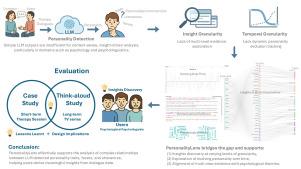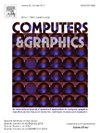PersonalityLens:为法学硕士驱动的个性洞察提供可视化的深入分析
IF 2.8
4区 计算机科学
Q2 COMPUTER SCIENCE, SOFTWARE ENGINEERING
引用次数: 0
摘要
大型语言模型(llm)在基于文本的人格评估方面已经显示出强大的潜力,并且越来越多地被领域专家作为辅助工具采用。用户现在不再关注预测的准确性,而是优先考虑洞察力驱动的分析,使用llm通过简单的口头提示来探索大量的书面和口头语言。然而,llm检测到的人格特征与用户在既定心理学理论和机制中将这些输出情境化的能力之间仍然存在差距。现有的工具往往缺乏对多层次洞察的支持,无法捕捉特征和方面随时间的动态演变,从而限制了更深入的分析。为了解决这个问题,我们提出了PersonalityLens,这是一个视觉分析工具,旨在增强个性分析中的洞察力发现。我们的设计基于领域专家和支持的全面需求分析:(1)深入探索检测到的特征及其相应的话语,支持不同粒度水平的见解;(2)探索人格特征和方面如何随着时间的推移在更精细的环境中动态演变;(3)将特征和方面与心理学理论结合起来。我们提出了两个互补的案例研究——一个基于虚构的电视对话,另一个基于治疗互动——展示了PersonalityLens对不同分析目标和背景的适应性。一项定性的有声思考用户研究表明,PersonalityLens支持上下文感知解释和洞察力发现。在这些发现的基础上,我们概述了设计意义,以启发未来的研究,并通过综合人格分析来增强心理治疗工具,以提供心理健康支持。本文章由计算机程序翻译,如有差异,请以英文原文为准。

PersonalityLens: Visualizing in-depth analysis for LLM-driven personality insights
Large Language Models (LLMs) have demonstrated strong potential for text-based personality assessment and are increasingly adopted by domain experts as assistive tools. Rather than focusing on prediction accuracy, users now prioritize insight-driven analysis, using LLMs to explore large volumes of written and spoken language through simple verbal prompts. However, a gap remains between LLM-detected personality traits and users’ ability to contextualize these outputs within established psychological theories and mechanisms. Existing tools often lack support for multi-level insights and fail to capture the dynamic evolution of traits and facets over time, limiting deeper analysis. To address this, we propose PersonalityLens, a visual analysis tool designed to enhance insight discovery in personality analysis. Our design is informed by a comprehensive requirements analysis with domain experts and supports: (1) in-depth exploration of detected traits and their corresponding utterances, supporting insights at varying levels of granularity, (2) exploration of how personality traits and facets dynamically evolve in finer contexts over time, (3) alignment of traits and facets with psychological theories. We present two complementary case studies — one based on fictional TV dialogue and the other on therapeutic interactions — demonstrating PersonalityLens’s adaptability to diverse analytic goals and contexts. A qualitative think-aloud user study shows that PersonalityLens supports context-aware interpretation and insight discovery. Building on these findings, we outline design implications to inspire future research and enhance psychotherapy tools with integrated personality analysis for mental health support.
求助全文
通过发布文献求助,成功后即可免费获取论文全文。
去求助
来源期刊

Computers & Graphics-Uk
工程技术-计算机:软件工程
CiteScore
5.30
自引率
12.00%
发文量
173
审稿时长
38 days
期刊介绍:
Computers & Graphics is dedicated to disseminate information on research and applications of computer graphics (CG) techniques. The journal encourages articles on:
1. Research and applications of interactive computer graphics. We are particularly interested in novel interaction techniques and applications of CG to problem domains.
2. State-of-the-art papers on late-breaking, cutting-edge research on CG.
3. Information on innovative uses of graphics principles and technologies.
4. Tutorial papers on both teaching CG principles and innovative uses of CG in education.
 求助内容:
求助内容: 应助结果提醒方式:
应助结果提醒方式:


